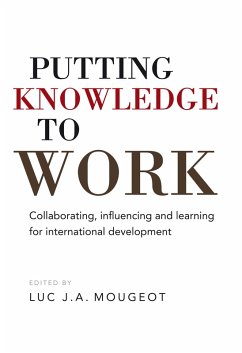Producing knowledge that is relevant and can be acted upon is essential for international development. There is a renewed urgency for knowledge from the civil society sector, particularly non-academic organizations, to be acknowledged and recorded, to be distilled and leveraged, in order to help the sector retain its relevance. Deep transformations are affecting the sector and global North CSOs are being challenged by funders and beneficiaries alike to be more agile and nimble in mustering knowledge and applying it to advance human rights, reduce inequality, and make our societies more inclusive, more just, and more sustainable. Putting Knowledge to Work unveils the often under-rated role that knowledge plays in non-governmental organizations' (NGO) work in international cooperation for development. How do they go about producing or accessing the knowledge which they need? How do they collaborate with others to do so? How do they strategize and apply knowledge to effect positive change locally and more broadly for development? How do they go about learning from practice to keep evolving as development actors? The book not only unpacks tensions and challenges faced by small- and medium-sized development NGOs in particular; it also analyses cases in which organizations have devised inspiring solutions to improve their own performance, often in the face of adversity. This book should be read by staff and managers of civil society organizations, government staff and philanthropic organizations, and students and researchers in the field of international development.
Dieser Download kann aus rechtlichen Gründen nur mit Rechnungsadresse in A, D ausgeliefert werden.


